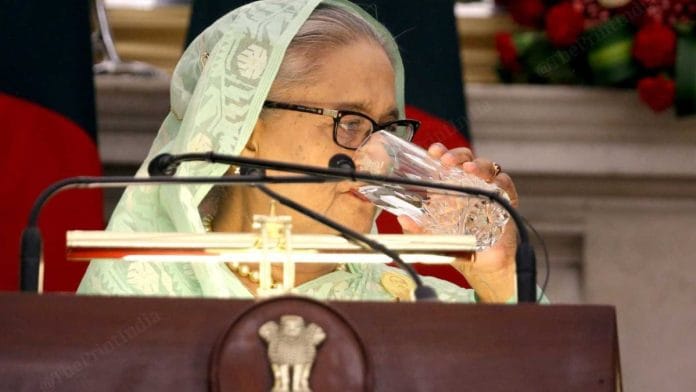New Delhi: A Bangladesh tribunal has sentenced ousted prime minister Sheikh Hasina to six months in prison for contempt of court, marking the first conviction against the former leader since protests toppled her government last year.
A reconstituted International Crimes Tribunal (ICT), a domestic war crimes tribunal established by the Hasina government in 2010, primarily to prosecute individuals accused of collaborating with Pakistan during the 1971 war, has delivered the verdict against her.
The three-member tribunal, headed by ICT Chairman Justice Md Golam Mortuza Majumdar, passed the sentence after reviewing a controversial audio recording that surfaced on social media last year. In the recording, Hasina reportedly tells Gobindaganj upazila ex-chairman Shakil Akand Bulbul: “I have had 227 cases filed against me, so I have received a licence to kill 227 people.”
The tribunal deemed the statement contemptuous, as well as a deliberate attempt to undermine the judicial process, and therefore handed down the six-month sentence on Hasina. Shakil Akand Bulbul, also implicated in the talks, was sentenced to two months’ jail.
The sentences will take effect once the two surrender or go into custody, officials have confirmed. Local reports have said the punishment can be non-rigorous imprisonment.
Chief Prosecutor Mohammad Tazul Islam told reporters that Hasina’s remarks, made public through a leaked phone call, posed a serious threat to ongoing legal proceedings against her in connection with the protesters killed during the July uprising. A government agency has conducted forensic authentication of the recording, the BBC reports.
According to a United Nations report, 1,400 protesters, including 12-13 percent children, were killed during the crackdown on protests in Bangladesh between 1 July and 15 August 2024 under Hasina’s government. The security forces shot the vast majority.
Hasina has been in exile in India since 5 August 2024, when her nearly 16-year tenure ended due to the protests. In December 2024, the Muhammad Yunus-led interim administration in Bangladesh sent a diplomatic note to India, requesting her extradition. The Ministry of External Affairs, India, confirmed the note but has not responded so far.
Last month, the ICT formally charged Hasina with crimes against humanity in another case, accusing her of “ordering the extermination of protesters”, among other charges. On 1 June, the charges became public during a live tribunal session. The ICT even ordered Bangladeshi authorities to present her before a court on 16 June.
Earlier, another controversy had erupted when a Facebook post revealed that the state-appointed counsel for Hasina—Aminul Gani Titu—had demanded her execution at one point. Titu acknowledged the comments but claimed that if he continued in his role, he would professionally represent her. But, as calls for his removal grew louder, Titu withdrew his name, with Amir Hossain appointed as Hasina’s defence counsel.
Cases against Hasina
The ICT in Bangladesh has 27 cases lodged over crimes against humanity during the July 2024 uprising, with Hasina and 205 others named as the accused, and 73 arrested so far. As many as 132 accused remain at large. One has died in custody.
So far, only three of these cases, including the contempt of court case against Hasina, have moved to the trial stage, whereas the other 24 are under preliminary investigation. Named in four cases, Hasina now faces jail in the case of contempt of court.
She also faces formal charges in another case that accuses her of inciting violence through provocative speeches; ordering the extermination of protesters using helicopters, drones, and lethal weapons; responsibility for the brutal murder of Begum Rokeya University student Abu Sayeed; responsibility for the brutal shooting deaths of six protesters at Chankharpul; and responsibility for the burning bodies of six people in Ashulia.
Ex-home minister Asaduzzaman Khan and ex-inspector general Chowdhury Abdullah Al-Mamun are the other accused in this particular case.
The third case of crimes against humanity against Hasina pertains to enforced disappearances, killings, and torture under her rule, and the last case concerns the killing of Hefazat-e-Islam leaders and activists.
During a hearing on the framing of charges, the chief prosecutor argued that the goal of the crimes against humanity was only to ensure that Hasina remained in power during the July 2024 unrest. He described her as the “central figure” behind all the crimes committed at the time.
(Edited by Madhurita Goswami)
Also Read: Protests rock Bangladesh after video of Hindu woman’s rape goes viral, local BNP politician held






